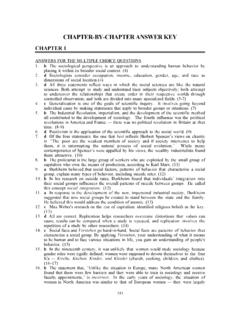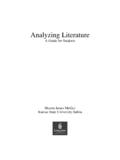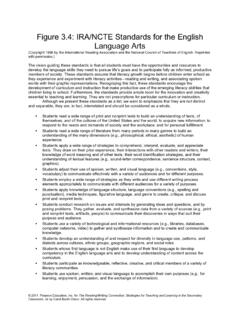Transcription of SENTENCE PARTS AND PATTERNS - wps.ablongman.com
1 SENTENCE PARTS . AND PATTERNS . Copyright 1995 2007 by Pearson Education, publishing as Longman Aaron, The little , brown Compact handbook , Sixth Edition THE FIVE BASIC. SENTENCE PATTERNS . Subject Predicate Copyright 1995 2007 by Pearson Education, publishing as Longman Aaron, The little , brown Compact handbook , Sixth Edition INDEPENDENT (MAIN) VS. DEPENDENT. (SUBORDINATE) CLAUSES. A main or independent clause makes a complete statement and can stand alone as a SENTENCE : The sky darkened. A subordinate or dependent clause is just like a main clause except that it begins with a subordinating word: when the sky darkened; whoever calls. Copyright 1995 2007 by Pearson Education, publishing as Longman Aaron, The little , brown Compact handbook , Sixth Edition exercise . SENTENCE combining: SENTENCE structures Combine each set of simple sentences below to produce the kind of SENTENCE specified in parentheses.
2 You will have to add, delete, change, and rearrange words. 1. Recycling takes time. It reduces garbage in landfills. (Compound.). 2. People begin to recycle. They generate much less trash. (Complex.). 3. White tissues and paper towels biodegrade more easily than dyed ones. People still buy dyed papers. (Complex.). 4. The cans are aluminum. They bring recyclers good money. (Simple.). 5. Environmentalists have hope. Perhaps more communities will recycle newspaper and glass. Many citizens refuse to participate. (Compound-complex.). Copyright 1995 2007 by Pearson Education, publishing as Longman Aaron, The little , brown Compact handbook , Sixth Edition answers TO exercise . Possible answers 1. The turn of the twentieth century ushered in improved technology and new materials. 2. A sturdy steel skeleton made the construction of skyscrapers possible.
3 3. By 1913 the towering Woolworth Building, with its Gothic ornaments, stood 760 feet (55 stories). 4. At 1450 feet the Sears Tower in Chicago now doubles the relatively puny height of the Woolworth Building. 5. Skyscrapers would not have been practical if Elisha Graves Otis had not built the first safe passenger elevator in 1857. Copyright 1995 2007 by Pearson Education, publishing as Longman Aaron, The little , brown Compact handbook , Sixth Edition TESTS FOR FINITE AND. NONFINITE VERBS (VERBALS). Test 1: Does the word require a change in form when a third-person subject changes from singular to plural? Yes Finite verbs: It sings. They sing. No Nonfinite verb (verbal): bird singing, birds singing Test 2: Does the word require a change in form to show the difference in present, past, and future? Yes Finite verb: It sings. It sang.
4 It will sing. No Nonfinite verb (verbal): The bird singing is/was/will be a robin. Copyright 1995 2007 by Pearson Education, publishing as Longman Aaron, The little , brown Compact handbook , Sixth Edition TERMS USED TO DESCRIBE. VERBS. Tense The time of the verb's action. Mood The attitude of the verb's speaker or writer. Voice The distinction between the active, in which the subject performs the verb's action, and the passive, in which the subject is acted upon. Person The verb form that reflects whether the subject is speaking, spoken to, or spoken about. Number The verb form that reflects whether the subject is singular or plural. Copyright 1995 2007 by Pearson Education, publishing as Longman Aaron, The little , brown Compact handbook , Sixth Edition exercise . Distinguishing sit/set, lie/lay, rise/raise Choose the correct verb and then supply the past tense or past participle, as appropriate.
5 1. Yesterday afternoon the child (lie, lay) down for a nap. 2. The child has been (rise, raise) by her grandparents. 3. Most days her grandfather has (sit, set) with her, reading her stories. 4. She has (rise, raise) at dawn most mornings. 5. Her toys were (lie, lay) out on the floor. Copyright 1995 2007 by Pearson Education, publishing as Longman Aaron, The little , brown Compact handbook , Sixth Edition answers TO exercise . 1. Yesterday afternoon the child lay down for a nap. 2. The child has been raised by her grandparents. 3. Most days her grandfather has sat with her, reading her stories. 4. She has risen at dawn most mornings. 5. Her toys were laid out on the floor. Copyright 1995 2007 by Pearson Education, publishing as Longman Aaron, The little , brown Compact handbook , Sixth Edition TENSES OF A REGULAR VERB. (ACTIVE VOICE).
6 Present Simple present: I walk. Present progressive: I am walking. Past Simple past: I walked. Past progressive: I was walking. Future Simple future: I will walk. Future progressive: I will be walking. Present perfect Present perfect: I have walked. Present perfect progressive: I have been walking. Copyright 1995 2007 by Pearson Education, publishing as Longman Aaron, The little , brown Compact handbook , Sixth Edition TENSES OF A REGULAR VERB. (ACTIVE VOICE) continued Past perfect Past perfect: I have walked. Past perfect progressive: I had been walking. Future perfect Future perfect: I will have walked. Future perfect progressive: I will have been walking. Copyright 1995 2007 by Pearson Education, publishing as Longman Aaron, The little , brown Compact handbook , Sixth Edition ACTIVE AND PASSIVE VOICE. Active Voice The Subject acts.
7 Subject = actor Transitive verb Direct object in active voice The city controls rents. Passive Voice The subject is acted upon. Subject = Transitive verb By actor object of in passive (optional). action voice Rents are controlled by the city. Rents are controlled. Copyright 1995 2007 by Pearson Education, publishing as Longman Aaron, The little , brown Compact handbook , Sixth Edition CASE FORMS OF. NOUNS AND PRONOUNS. Subjective Objective Possessive Nouns Boy Boy Boy's Jessie Jessie Jessie's Personal pronouns Singular 1st person I Me My, mine 2nd person You You Your, yours 3rd person He Him His She Her Her, hers It It Its Plural 1st person We Us Our, ours 2nd person You You Your, yours 3rd person They Them Their, theirs Relative and interrogative pronouns Who Whom Whose Whoever Whomever Which, that, what Which, that, what Indefinite pronouns Everybody Everybody Everybody's Copyright 1995 2007 by Pearson Education, publishing as Longman Aaron, The little , brown Compact handbook , Sixth Edition A Test for Case Forms in Compound Constructions Identify a compound construction.
8 (He, Him) and (I, me) won the prize The prize went to (he, him) and (I, me.). Write a separate SENTENCE for each part of the compound. (He, Him) won the prize. (I, Me) won the prize. The prize went to (he, him). The prize went to (I, me). Choose the pronouns that sound correct. He won the prize. I won the prize. [Subjective]. The prize went to him. The prize went to me. [Objective]. Put the separate sentences back together. He and I won the prize. The prize went to him and me. Copyright 1995 2007 by Pearson Education, publishing as Longman Aaron, The little , brown Compact handbook , Sixth Edition A Test for Who vs. Whom in Questions Pose the question. (Who, Whom) makes that decision? (Who, Whom) does one ask? Answer the question, using a personal pronoun. Choose the pronoun that sounds correct, and note its case. (She, Her) makes that decision.
9 She makes that decision. [Subjective]. One asks (she,her). One asks her. [Objective]. Use the same case (who or whom) in the question. Who makes that decision? [Subjective]. Whom does one ask? [Objective]. Copyright 1995 2007 by Pearson Education, publishing as Longman Aaron, The little , brown Compact handbook , Sixth Edition A Test for Who vs. Whom in Subordinate Clauses Locate the subordinate clause. Few people know (who, whom) they should ask. They are unsure (who, whom) makes the decision. Rewrite the subordinate clause as a separate SENTENCE , substituting a personal pronoun for who, whom. Choose the pronoun that sounds correct, and note its case. They should ask (she,her). They should ask her. [Objective]. (She, her) makes the decision. She makes the decision. [Subjective]. Use the same case (who or whom) in the suboridnate clause.
10 Few people know whom they should ask. [Objective]. They are unsure who makes the decision. [Subjective]. Copyright 1995 2007 by Pearson Education, publishing as Longman Aaron, The little , brown Compact handbook , Sixth Edition exercise . Choosing between subjective and objective pronouns Select the appropriate subjective or objective pronoun(s) for each SENTENCE . Lisa and (I, me) were competing for places on the relay team. The fastest runners at our school were (she, her). and (I, me), so (we, us) expected to make the team. (She, Her) and (I, me) were friends but also intense rivals. The time trials went badly, excluding both (she, her) and (I, me) from the team. Next season we are determined to earn at least one place between (she, her) and (I, me). Copyright 1995 2007 by Pearson Education, publishing as Longman Aaron, The little , brown Compact handbook , Sixth Edition answers TO exercise .









